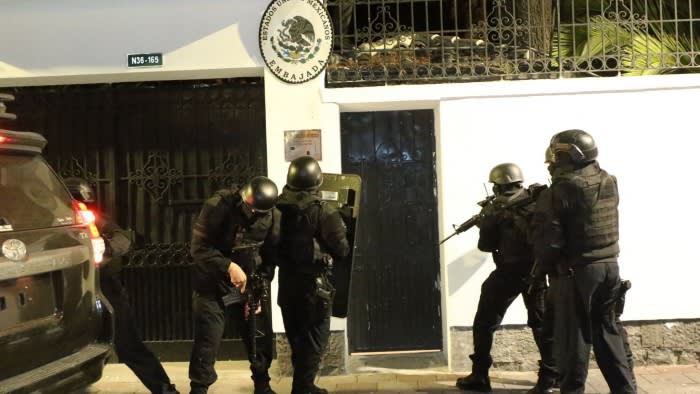Open Editor's Digest for free
Rula Khalaf, editor of the Financial Times, picks her favorite stories in this weekly newsletter.
Mexico has severed diplomatic ties with Ecuador and vowed to bring the Andean country before an international court after police stormed its embassy in Quito and arrested Ecuador's former vice president who was taking shelter there after being convicted of corruption.
The ultra-conservative government of President Daniel Noboa ordered officers to enter the embassy buildings after Mexico's leftist administration granted asylum to Jorge Glas, who served as Ecuador's vice president from 2013 to 2018 and was later sentenced to 14 years in prison.
Police forced their way into the embassy late on Friday evening while heavily armed forces guarded outside. A video posted on social media showed two black police jeeps leaving the diplomatic building with sirens blaring as Acting Mexican Ambassador Roberto Canseco shouted, “No, no, this is a violation, this is not possible!” The police threw him to the ground.
“This is absolutely unacceptable,” Canseco told reporters afterward. “They beat me, pushed me to the ground. I physically tried to stop them from entering. They searched the Mexican embassy in Quito like criminals.
Andrés Manuel López Obrador, Mexican President, accused Ecuador of “a flagrant violation of international law and Mexican sovereignty” and said he ordered the immediate suspension of diplomatic relations.
The Vienna Convention of 1961 guarantees the inviolability of diplomatic buildings, stipulating that “officials of the receiving State may not enter them except with the approval of the head of mission.” Forced entry into an embassy by the host government is almost unheard of, even in military dictatorships.
But Noboa said that “the immunities and privileges granted to the diplomatic mission that housed Jorge Glass had been abused” and that his political asylum was “contrary to the legal framework.”
He added: “Ecuador is a sovereign state and we will not allow any criminal to remain in a state of impunity.”
Alicia Bárcena, Mexico's foreign minister, said she would take the case to the International Court of Justice “to denounce Ecuador's responsibility for violations of international law.” She added that many Mexican diplomats were injured during the raid.
The dispute between Ecuador and Mexico has been escalating since Glass took refuge in the embassy in December. He fled there after prosecutors posted chat messages suggesting he was released early from his long prison terms in 2022 because a prominent Ecuadorian drug trafficker bribed a judge.
López Obrador angered Ecuador's government this week when he suggested that Noboa's election victory last year against a leftist opponent was thanks to the opponent being unfairly blamed for killing another candidate during the campaign. Ecuador ordered the expulsion of the Mexican ambassador because of these statements.
Recommended
The Mexican president, like many other leftist leaders in Latin America, remained loyal to former Ecuadorian President Rafael Correa, who ruled the country for a long time. The authoritarian leftist leader fled to Belgium in 2018 after an arrest warrant was issued against him on corruption charges. Glass was Correa's vice president, and Luisa Gonzalez, who lost to Noboa last year, was backed by Correa.
Noboa (36 years old) enjoys increasing popularity among Ecuadorians and strong support from Washington after declaring a comprehensive war on drug trafficking. The scion of a wealthy banana export family, he used emergency powers to deploy troops on the streets and sent the army to take over gang-infested prisons, using tactics partly borrowed from El Salvador's powerful leader Nayib Bukele.
Ecuador, a former haven between the two major cocaine-producing nations, Colombia and Peru, has suffered escalating violence and rising murders in recent years, as drug cartels turned it into an important shipping point for cocaine bound for Europe.

